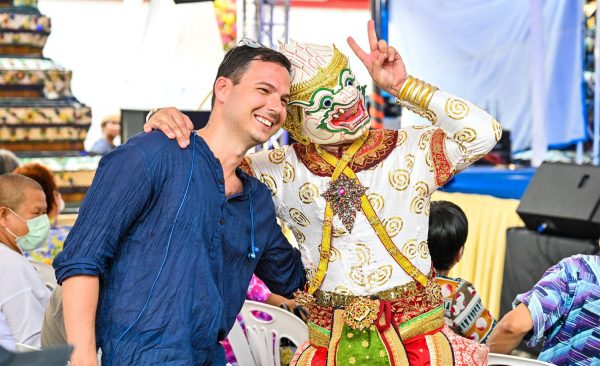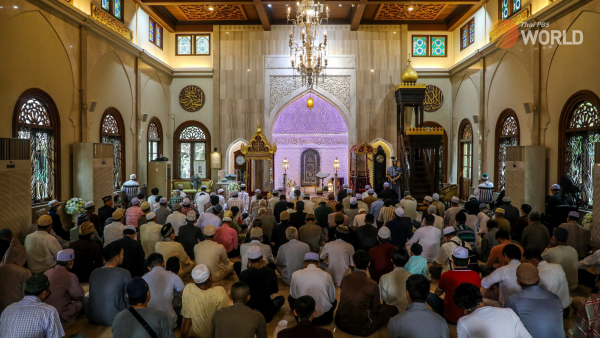“Thai food is the most delicious medicine” – Chef Chumpol

The Michelin-starred chef demonstrates how food sustainably can be achieved
Michelin-starred Chef Chumpol Jangprai has a clear image of himself in a decade to come: he will be enjoying the fresh air and living on his farm in Wang Nam Khiao in Nakhon Ratchasima province. There, he grows chilli and various other Thai herbs together with lavender and supplies them to his restaurant. And while he’s in residence, visitors who share his values about nature and sustainability come to stay as guests.
He plans to use all organic ingredients at the two Michelin-stars R-Haan restaurant he co-founded in Bangkok. Every week, he will divide his time between the farm and his restaurant. And he will train a new generation of chefs to follow this legacy.
Well recognised for his culinary skills, his goals these days go beyond quality and delicious food. He wants Thailand to be the land of food sustainability. Throughout his long career, Chef Chumpol has demonstrated his commitment to sustainable development, bringing various indigenous ingredients to fine dining tables. All ingredients at his restaurant are sought domestically and that benefits local food producers while promoting biodiversity and improving the quality of life in the communities.
“For me, it’s all about Thai taste and Thai ingredients. All the beef I use in my menu comes from local farms. The fish are all caught in Thailand, and I take pride in using 100% Thai ingredients. To me sustainability goes away beyond organic,” he tells Thai PBS World.
Late last year, Chef Chumphon was appointed a Sustainable Food Ambassador by FeedUp@UN. He was selected from amongst several other candidates and it is obvious that what he has done all along melds well with the mission of FeedUp@UN. The 100% use of local ingredients at his restaurant sits well with the United Nations Sustainable Development Goals as it supports food sustainability by reducing greenhouse gas emissions, strengthening climate resilience, and ending hunger.
He is also interested in food as cancer treatment, pointing out that this disease is one of the main killers in Thailand. “I’m interested in cooking Thai food for cancer treatment. I believe Thai herbs can fight cancer cells as many of them can boost the immune system. I think Thai food is the most delicious medicine in the world.”
Happy Meals: cannabis-infused cuisine now being served
“We grabbed the chance to educate the public about cannabis consumption and other related facts, ” she sa ys . The Narcotics Act of B.E. 2522 that identified cannabis as an illegal substance in 1979 put Thailand behind many nations in term s of research into breeding varieties for health use.
Thais love spicy food so the first things Chef Chumphol planted at his so-called Chateau chilli were different kinds of these hot peppers.
“We eat chilli with every meal. Do you know that chili has the most residue? Residue causes cancer and comes from the food we consume every day – morning, noon and night. So, I decided to start with an organic chili plantation,” he explains.
His plan to grow chilli decided, Chef Chumphol threw himself into studying and researching all things chilli, including its medical benefits and safe plantations.
“Nowadays, we import a lot of chilli from India, Cambodia and China and none of it is organic.”
This year, diners at R-HAAN will have chilli from the chef’s farm. He currently grows nine varieties including yellow chillies, green chillies and some chili peppers. The Chateau will also grow rare species from Kaset Kamphaeng Saen.

The chilli plantation is the first phase of his farm, spread over 30-rai on which he started work in 2019. The next phase will be rice fields to farm catfish. “I will grow rice for catfish farming. The fish price is now very steep at about 280 baht per kilogramme.”
Chef Chumphol is also growing lavender and intends to make essential oil out as well as use the produce in his dishes.
“Later this year, the flowers will be blooming and the chilli plantation will be bearing fruit. I want to open an agricultural centre for visitors. Four rai will be allocated to a ‘Thai Curry’ cultivation area where all components of Thai curry are grown including chilli, kaffir, galangal, lemongrass, onion and garlic. Later, I will provide accommodation – perhaps a high quality tent with facilities for visitors,” he said.
Zero waste policy
Sustainability is not all about consuming but also about minimizing waste. Food waste is another area that all leading chefs have to tackle and Chef Chumphol is committed to “zero waste” practice at his restaurant.
“For example, if today I order one Seabass to make curry, the remnants are used in the chilli dip. The head goes into the staff’s food. The bones are used to make a soup stock. If anything is left, it can be used to produce fertilizer. Therefore, it is definitely zero loss – nothing goes to waste,” he says.
It’s important to plan well to cut down on waste and here Chef Chumphol feels that the availability of parcel and delivery services could enhance the practice of zero waste by doing away with the need for storage.
“I can order lobsters for use on just one day – no need to stock them. These days our staff go to Talad Thai (market) every day and we instruct them not to buy a lot. This is our new policy.”
Designing the menu around the seasons, which has been the practice at R-HAAN restaurant from the beginning, also helps minimise stock as well as promoting consumption according to the seasons. “This too is a good way of addressing the environmental issues like global warming,” he says.







